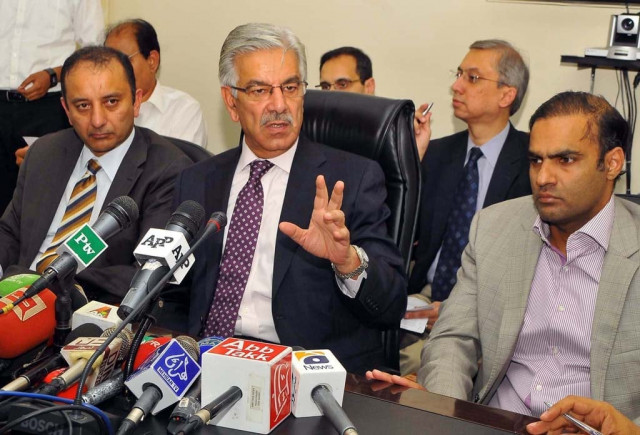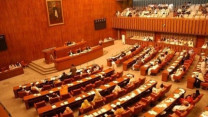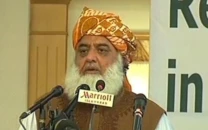No cheap electricity: Govt to increase power tariff to phase out subsidy
Consumers will face a hike in power tariff by Rs3 to Rs 6 per unit for different categories.

Government will increase the tariff for industrial and commercial consumers from August 1, and for domestic consumers using over 200 units per month from October 1, says Minister for Water & Power. PHOTO: PID
The government has decided to raise the power tariff for industrial, commercial and domestic consumers to phase out subsidy, Minister for Water and Power Khawaja Asif announced on Wednesday.
Addressing a news conference, Asif said the government would increase the tariff for industrial and commercial consumers from August 1, and for domestic consumers using over 200 units per month from October 1. While he didn’t disclose the exact hike in the tariff, he said it would range between 30% and 70%. Consumers, as such, would face an increase by Rs3 to Rs6 per unit, depending on which category they fall in, he added.
“There has been no adjustment in power tariff for the last 14 months and the government is forced to pay Rs480 billion to clear circular debt. We now want to raise power tariff to avoid circular debt and phase out subsidy … the government will face circular debt worth Rs600 billion to Rs700 billion next year if the power tariff is not increased,” Asif added.

He, however, said the government would protect those consumers who couldn’t afford the increase in tariff and used only 200 units per month.
The minister also unveiled the five-year energy policy, which the Council of Common Interest (CCI) approved in its meeting on Wednesday.
He said the government was also working out a plan with the provinces to regulate the markets. He added that the government would legislate to close markets at the same time across the country in the evening to save 1,200 megawatts of electricity. The government was expected to complete the distribution of six million energy savers by December this year that would save 700MW.
He said the government would also continue efforts to reduce load-shedding. “Power production reached a historical level of 16,170MW on Tuesday,” he said, adding that the government would try to produce 15,000MW on average. According to him, the shortfall stands at 3,200MW against the 5,000MW before the PML-N government came into power.
“Power theft amounts to Rs120 billion to Rs200 billion per annum … The government is going to make power and gas theft an un-bailable offence with huge penalties,” the minister said, adding that the government would also set up utility courts to take action against the consumers involved in power and gas pilferage. The cases of big power defaulters would be handed over to the Federal Investigation Agency.

Asif informed journalists that the issue of adjuster to settle power dues with the provinces had not been finalised yet. The boards of directors of the power firms have been dissolved and new chiefs would be appointed soon.
The minister said talks with India were under way to import electricity. “However, power import is not possible unless it installs the system,” he added. For Balochistan, meanwhile, an arrangement would be made to import electricity from Iran.
He said the thrust of the new energy policy was to rationalise the energy mix by focusing on power generation through coal instead of fuel. Under the new policy, the government has also decided to increase the gas prices for all users except domestic consumers. Gas consumption in the CNG sector would also be reduced to divert it to the power sector.
An official of the ministry of water and power said that the government was considering a plan to give guarantees to industrial consumers for an uninterrupted power supply after the hike in tariff.
Earlier Prime Minister Nawaz Sharif congratulated the CCI members for reaching consensus on a matter of utmost importance.
“I wholeheartedly congratulate the provinces for evolving the consensus, but the responsibility still rests with the provinces to ensure implementation of the energy policy,” he said after the meeting approved the new energy policy.
“We respect the mandate of all the provincial governments and would support them in their endeavours for the welfare of the people,” he added.
The prime minister stressed the need to learn from each other’s experiences and expertise. “Each province should share its success with other provinces so that it can be replicated,” he added.
Published in The Express Tribune, August 1st, 2013.



















COMMENTS
Comments are moderated and generally will be posted if they are on-topic and not abusive.
For more information, please see our Comments FAQ